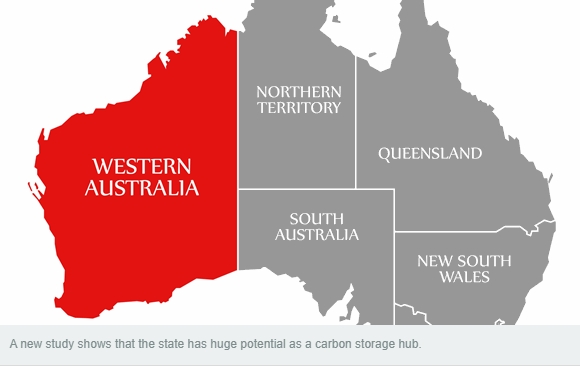
The government of Western Australia (WA) is investing $2.81 million (AUD 4.3 million) in a carbon capture, utilization, and storage (CCUS) action plan as a new study shows that the state has huge potential as a carbon storage hub.
The study, commissioned and co-funded by the WA LNG Jobs Taskforce and undertaken by the Commonwealth Scientific and Industrial Research Organisation (CSIRO) and the Global CCS Institute, found that WA is capable of storing its own carbon and turning existing infrastructure into CCUS hubs, according to a recent statement from the WA government.
The state’s action plan will aim to accelerate deployment of proven CCUS technologies in WA, support research into new CCUS technology, and attract investment in CCUS. The state government is expected to introduce legislation to allow for the transport and storage of greenhouse gases by the end of the year, the statement said.
According to the study, the construction of CCUS hubs would support cross-sector collaboration towards decarbonization, including the co-location of hydrogen and ammonia industries. The hubs would also have the potential to attract significant overseas investment for the Western Australian economy, potentially boosting the state’s GDP by billions of dollars, and would generate 37,000 construction jobs, along with 500 permanent jobs.
WA already has significant infrastructure supporting high-emitting industries that could be repurposed for CCUS”, the study said, adding that the infrastructure is geographically adjacent to the state’s significant storage capacity. Repurposing infrastructure also offers substantial cost savings, the study noted. “The hubs model not only provides the economies of scale in development but also makes the CCUS process viable for smaller operations and facilities for whom the technology would otherwise be out of reach”, it added.
The study recommends several actions to realize the state’s opportunity for CCUS development, including the recognition of CCUS as part of WA’s portfolio of measures to achieve its emissions reduction target, and appropriate policy and regulatory frameworks to support CCUS into the future. The study also urges actions be taken at the soonest, to allow for lead times of seven to 10 years. “If WA waits until CCUS projects are economic for developers and customers, there likely won’t be enough time to get the projects operational before 2050”, the study remarked.
In conclusion, the study said that, to be successful, WA hubs would need the right business model, appropriate governance, government-industry collaboration and supportive regulatory/policy frameworks.
“WA is a world leader in mining and natural gas, and that means we are perfectly placed to become a world leader in Carbon Capture, Utilization and Storage”, WA Premier Roger Cook said in the statement. “We can leverage our skilled workforce, existing infrastructure and unique geology to attract global CCUS investment – helping to create local jobs and strengthen our State's economy”.
"We know there is growing demand from our trading partners for projects that support their energy security, but that also incorporate CCUS”, Cook added. “My Government is committed to slashing our State's emissions and supporting decarbonization across the globe – and CCUS will play an important role in managing the transition to a low-carbon future”.
"Carbon Capture, Utilization and Storage will provide WA's industrial and mining industries with access to opportunities to decarbonize”, Mines and Petroleum Minister Bill Johnston said. “Understanding the benefits of developing one or more CCUS hubs, and developing legislation to facilitate greenhouse gas transportation and storage, is important for our State's future”.
The study was funded by various members of the LNG Jobs Taskforce including Shell Australia, BP Australia, Chevron Australia, WA Government, Eni Australia, MIMI, National Energy Resources Australia, Santos, and Woodside Energy. Shell Australia led the project as a key initiative of the LNG Jobs Taskforce’s Technology and Decarbonization Working Group.